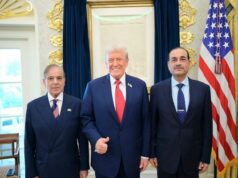Staying out of Ukraine, despite immense pressure from the US and the EU, was one of the two best things that India did in terms of foreign policy during Prime Minister Narendra Modi’s last term, says Amit Gupta, senior adviser, Forum of Federations in Ottawa.
The advantages of that go beyond getting cheap oil from Russia. It also gave India the leeway to navigate its own foreign policy.
“The second one, which I am very proud of, is vaccine maitri,” says Gupta, who’s a former faculty of the US Air Force Air War College, and works mostly on international security, pop culture, and politics. He’s also coached the War College soccer team.
“Because if you look at that, while the US and the west were hoarding vaccine supplies and raw materials, India went out an gave it to people as far away as Antigua, and neighbours like Bangladesh,” he says. The fact that India did this for free in many cases is very very creditable, he asserts. Until it stopped because the US cut off the supply of raw materials, he adds.
The two areas where India didn’t do so well include dealing with China and having too many expectations from the United States, believes Gupta.
“There’s no sense of imagination left on how to deal with China. The positions are very rigid, and we are losing out, because China’s the behemoth in Asia,” he says.
Rattling off figures, he notes that China has 870 odd billion dollars of trade with ASEAN, 780 billion with the EU, 670 billion with the U.S., and about 300 billion with the Japanese and the Koreans.
‘And the Japanese and the Chinese and the Koreans hate each other. But the one thing they say is that nothing gives us greater joy than to make money off our enemies,” says Gupta. “India’s trade with China is about a 130 billion or so.”
All these countries say they have valid territorial disputes with China, but that doesn’t mean we can’t have a trading arrangement with it.”
Another “minor miss,” he says, “is that you still have an unruly neighbourhood.”
If you take out Bangladesh and to some extent Sri Lanka, India does not have a sense of amity in the region, which would allow you to expand your foreign policy and encourage greater economic cooperation, he feels.
How does the huge trade deficit with China, which applies not just to India but to almost every nation that China deals with, impact relations?
“The problem is that India (and the US) talk about greater reciprocity and soon, but when I talk to Indian manufacturers, they say the problem isn’t China, the problem is India,” he says.
“Because until your goods leave the gate of the factory, you are competitive with China. But they minute they go out and all the state and national taxes get slapped on, you suddenly non-competitive with the Chinese.”
The main issue? The Chinese think big, India doesn’t. They have reached out where other people don’t want to go,’ says Gupta, noting how a tiny place like Tierra Del Fuego has only two car dealerships, Chery, which is Chinese, and Hyundai, which is korean. And how Brazil is awash with Chinese cars.
“Another major issue is that the Chinese have put a huge emphasis on education, while India as pushed education into a downward spiral,” he adds. Apart from scaling up top notch Universities, the three countries which are filing the most patents each year in the world are China, Japan and South Korea, he notes.
The conversation then moves on to India-US relations, the insignificance of the QUAD when compared to AUKUS. “Why is it that three White Countries (US, UK, Australia) are determining the security architecture of the Indo Pacific?” asks Gupta.
Watch the full interview to know the answer to that question, as well as get intriguing and unconventional takes on India’s relationship with the US, UK and Russia, the issues plaguing the Indian diaspora, the American (and Canadian) hypocrisy over the Khalistanis, why India should under no circumstances ease its liability laws to allow American companies like Westinghouse sell it nuclear reactors, and finally, can China and India kiss and make up?
In a career spanning three decades and counting, Ramananda (Ram to his friends) has been the foreign editor of The Telegraph, Outlook Magazine and the New Indian Express. He helped set up rediff.com’s editorial operations in San Jose and New York, helmed sify.com, and was the founder editor of India.com.
His work has featured in national and international publications like the Al Jazeera Centre for Studies, Global Times and Ashahi Shimbun. But his one constant over all these years, he says, has been the attempt to understand rising India’s place in the world.
He can rustle up a mean salad, his oil-less pepper chicken is to die for, and all it takes is some beer and rhythm and blues to rock his soul.
Talk to him about foreign and strategic affairs, media, South Asia, China, and of course India.




